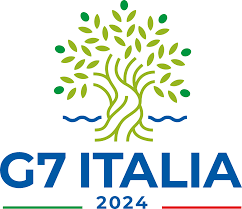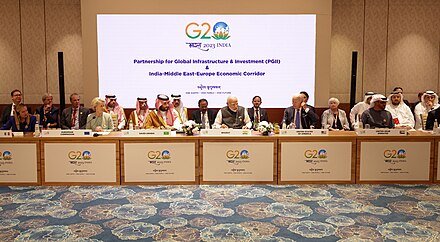
Why in news?
- The latest 50th G7 Summit attended the leaders of the most developed countries of the world took place in Italy from the 13th to 15th of June of 2024.
- This important meeting was not only the anniversary of the group’s founding but also was accompanied by important changes in the geopolitics and economy.
- That the Prime Minister came after his third-term election win, India’s part and play at this summit signified increasing power in world affairs.
Promotion to G7 Partnership for Global Infrastructure and Investment
- One of the primary focuses at the summit was the further development of the G7 PGII initiative which was introduced during the 48th G7 Summit in 2022.
- Its primary goal is the infrastructure for development 2027, in which the infrastructure deficit of forty trillion dollars for the developing world will be filled.
- The G7 delegates agreed to launch infrastructure partnership worth of $600 billion in order to ensure that funding is values, high impact, and transparent. The purpose is to address the critical infrastructure demands of LICs and developing states targeting improved accessibility and overall development.
- The PGII is presented as a countermeasure to the BRI which provides a better option for the G7 countries who believe that their nation is guided by the concepts of democracy and transparency of governance.
- The G7 has to put serious capital into making sure that it develops first-class infrastructure that can be inclusive as well as environmentally sustainable so that it can be able to work as a partner of choice in developing nations hence making it a major development player in the Global north.
Support and Promotion of the India-Middle East-Europe Economic Corridor

- Out of all listed measures mentioned, the India-Middle East-Europe Economic Corridor (IMEC) is crucial and attained relatively high attention.
- The recently launched IMEC, an essential branch of the PGII, is dedicated to establishing multi-modal transportation infrastructure that encompasses road, rail, and sea links between India, the Middle East, and Europe.
- It is expected to deepen, narrow, and strengthen this corridor for trade, energy, and information technology.
IMEC’s Structure:
- East Corridor: It links India to the Arabian gulf.
- Northern Corridor: Imagining the Gulf with Europe as focal points.
- Inclusions: railway tracks, Railway tracks for ships, road connections, electricity wire, hydrogen pipe line, superfast data wire.
- This framework the IMEC agreement is signed during the G20 Summit in New Delhi in September 2023, comprises India, the US, Saudi Arabia, the UAE, the European Union, Italy, France and Germany.
- This project also seeks to bring forward the economic cooperation as well as to establish an alternative to the conventional Suez Canal so as to potentially cut down the time and cost of shipment.
Support to Infrastructure Projects: Lobito, Luzon, and Middle Corridors
- Lobito Corridor:
- This corridor initiated from the Lobito the port city of Angola through the Democratic Republic of the Congo (DRC) joining Zambia. It is expected to generate a positive effect on the Central Africa economy’s integration and connection.
- Luzon Corridor:
- This corridor is located at the island of Luzon in Philippines; it could act as the key to boosting the growth of economy of the nation because of the improvement on infrastructure and trade.
- Middle Corridor (Trans-Caspian International Transport Route):
- Also known as TITR this is still another corridor that joins Europe and Asia but not by the northern and southern corridors.
- It enhances business and commercial link by enhancing communication as well as transport networks.
- All these are very crucial projects that have significant impacts on the development of the regions, and, particularly, efficiency of the interregional trade, and the level of economic integration of different regions of the world.
The Great Green Wall Initiative
- To tackle desertification and land degradation, G7 restated its support to the Great Green Wall project.
- This man-made project is in the ambitious stance to plant a wall of trees crossing the Sahel area from the west to east of Africa.
- It is intended to bring measures to halt the expansion of the Sahara Desert, the enlargement of the species diversity and the supply of the work for local people.
- Great Green Wall has major contribution to combating environmental issues and enhancing sustainable SLM and community and viability.
- Such support means that the G7 is devoted to the cause of climate change and sustainable development in areas affected vulnerable to it.
Enhancing Interoperability of AI Governance
- The G7 summit also dictated the urgency of governance of AI.
- To increase clarity, compatibility, and workability of governance strategies of AI in different countries, the G7 leaders committed to increasing the coordination between all members to make the processes more certain, responsible, and transparent.
- This commitment can be to address the risks and also to contain them while promoting innovation and development that is sustainable, prosperous and healthy for the society and the people involved.
- The push for global standards by the G7 is therefore important for the main reason of building trust, avoiding misuse and to ensure that AI generates inclusive benefits.
Understanding the G7: A Brief Overview
About the G7 Summit:
- Members: The countries that are prominent consumers of genetic resources are France, Germany, Italy, the United Kingdom, Japan, the United States, and Canada.
- Guests: EU, IMF, World Bank, United Nations and other international organization’s leaders and government officials especially in the third world countries.
- Nature: Temporary alliance of nations that have no standing secretariat and do not work within written international conventions.
- Decision-Making: Coordinating, using the economic and political muscle of members to shape global’s events.
- Origins:
- The G7 was the result of the oil crisis of 1973 and the following financial difficulties.
- The first MW started with six industrialized countries at the time being the United States, the United Kingdom, France, West Germany, Japan and Italy in 1975.
- Canada joined in 1976 and the grouping took the name G7.
- Russia joined in 1997 to become the G8 but was evicted in 2014 as the Crimea seized and the group became G7 once more.
Purpose and Significance:
-
- Dialogue: Serves as the venue by which important issues are discussed and explained in an openly.
- Collective Action: Aligns strategies and policies to address the contemporary global issues such as trade, security, and climate change.
- Agenda-Setting: This body affects international policies or priorities in some way.
- Economic Power: Holds 60% of the global net wealth and accounted for 46% of total world GDP till recently.
- Population: Home to 10 percent of the world’s population.
India’s Role in the G7: Importance and Challenges
- Even though India is not officially part of the G7 Summit, being invited as a guest to recent summits shows how its influence is spreading worldwide.
- India’s importance lies in its strong economy, strategic position in the Indo-Pacific region, and its efforts in dealing with the European energy challenges. Let’s break it down:
- India’s Economic Power:
- India’s GDP is around $3.57 trillion (without adjustments), surpassing the economies of four G7 countries.
- It stands out as one of the world’s fastest-growing economies, with a promising market and a well-trained workforce.
- India’s Economic Power:
why the Indo-Pacific region is so important strategically:
- Partnerships: Building strong relationships with countries like the US, UK, France, Germany, and Japan is key for strategic reasons.
- Containing China: It’s crucial to counterbalance China’s growing influence in the Indian Ocean, and this region plays a big role in that.
How the region deals with the European energy crisis:
- Russian Oil :
- India serves as a middleman for discounted Russian oil, which is refined in India and then sent to Europe.
- This helps address the energy needs in Europe.
Dealing with Power Struggles:
- Balancing Act:
- Relying on Russia for military gear creates issues amidst West-Russia tension.
- Juggling strong economic connections with the US and China.
- Handling differences in approaches within the West towards Russia and China.
- Coping with internal political strife in Western democracies.
Conclusion
- The recent G7 Summit put a spotlight on key worldwide concerns like building infrastructure, protecting the environment, and managing technology.
- India’s involvement in this summit is crucial for tackling economic, geopolitical, and strategic obstacles.
- With the G7 influencing international teamwork, India’s increasing participation shows its significance in the changing global landscape. This summit stresses the importance of working together to handle urgent global issues.
People Also ask
Q1: When and where was the 50th G7 Summit held?
Ans: The 50th G7 Summit was held in Italy from June 13 to 15, 2024.
Q2: Why was the 50th G7 Summit significant?
Ans: It was significant because it celebrated the 50th anniversary of the G7, showcasing fifty years of economic and geopolitical teamwork among the top economies worldwide. The summit focused on crucial matters such as global infrastructure growth, climate change, and geopolitical hurdles.
Your point of view caught my eye and was very interesting. Thanks. I have a question for you.
Your article helped me a lot, is there any more related content? Thanks!
Thanks for sharing. I read many of your blog posts, cool, your blog is very good.